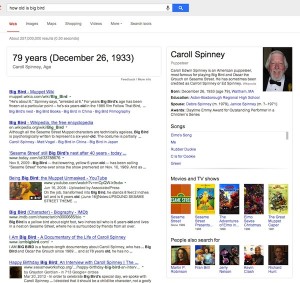In case you don’t already know, the world of Search Engine Optimisation (SEO) is going to the birds. Or more specifically, the Hummingbird.
Announcing its brand new algorithm for search recently at its birthday, Google’s Hummingbird claims to make search more natural, contextual and human. In other words, trying to “game” the system through unrelated keywords, meta-tags, links, and other spammy devices may work less effectively in future.
Hummingbird is huge (pardon the irony) because the last time Google made such an overhaul of its search algorithm was perhaps in 2001. Which is more than a decade ago.
So what are some of the changes behind this new “buzz”?
Conversational Search
Instead of merely relying on keywords strung together, Google is now trying to make meaning of sentences. In other words, it is what we call natural language processing – the ability for a search engine to understand what a sentence is about, pair it with semantic search, and linking facts and pages together.
You can check out how this works with this impressive example given recently:

Courtesy of Search Engine Land
Context – Who, What, When, Where and How
Beyond language, Google’s new algorithm will also learn more about you so that it can match results more closely to what it perceives to be your preferences. Sounds kind of scary isn’t it? Mining data such as one’s location, history of searches, and other information makes it uncannily accurate.
Consider this other example here, where Google’s search actually customises the results according to one’s location while throwing up useful weather data:

Courtesy of Search Engine Land
Or maybe this example featuring a much larger artificial bird:

Courtesy of Search Engine Land
Pretty cool isn’t it?
Mobile and Tablet Friendly
The other great innovation from Google is that it now tries to fit stuff into that tiny square you’re using to surf. Yes, it is becoming more intelligent. Improvements are made on mobile searchsuch that its cleaner, simpler, and optimised for touch with results clustered on cards so that its easier to focus on the answers you’re looking for.
Voice
Move away Siri. Google’s search is now voice enabled. There is now a little microphone icon at the side of the Google search bar which allows you to speak into the search bar.
Predicting the Future from Your Past
Beyond the “Gee whizz!” examples above, what Google’s new search algorithm does is to study your historical searches and web surfing behaviours to kind of predict your future. I know, its sort of “Big Brother”-ish if you think about it. However, for frequent users of Google Search (like me), such intuitive capabilities are more than welcome, in return for quicker and more accurate searches.
Helpful and Authoritative Content
Finally, and perhaps most importantly for bloggers like us, Google claims that its Hummingbird will only fly to the flowers that produce real, sweet nectar. In other words, it will prioritise real “flowers” (content) over fake spammy ones that try to game the system.
Two things are worth noting here:
1) Producing helpful content that addresses the questions and problems that people are looking for. Create stuff that can achieve Youtility.
2) Increasing your authority by being seen as a thought leader in a particular field. Here, it may pay to concentrate your energies on longer form in-depth content that shapes you to be an expert in a unique area.
Beyond the above, this blog suggests that the following other factors are useful in the new world of Hummingbird:
1) Creating impactful titles that have more action words (verbs and adverbs rather than nouns).
2) Using extreme wordings, eg “kill”, “bleeding”, “shocked”.
3) Using numbers, eg “11 Ways to Improve Your Content”.
Death to Keywords and Links?
Does the advent of Hummingbird result in a death to keywords, links and other SEO strategies employed by time honoured search engine marketers? Not really. Google still uses PageRank in the new algorithm, which works by….
“…counting the number and quality of links to a page to determine a rough estimate of how important the website is. The underlying assumption is that more important websites are likely to receive more links from other websites.” (source: Wikipedia)
Of course, how it does this may be different since it’s heightened intelligence would help discard links from spammy bot sites that are set up to artificially increase one’s page ranking.
Are you prepared for Google’s Hummingbird? Any other ideas how we can make our content “sweeter”?
Let me end with this wonderfully scripted and directed advertisement from Google India, which demonstrates its new capability in a rather beautiful story of romantic reunion.

